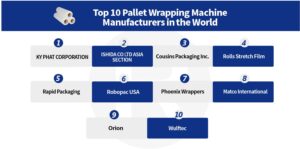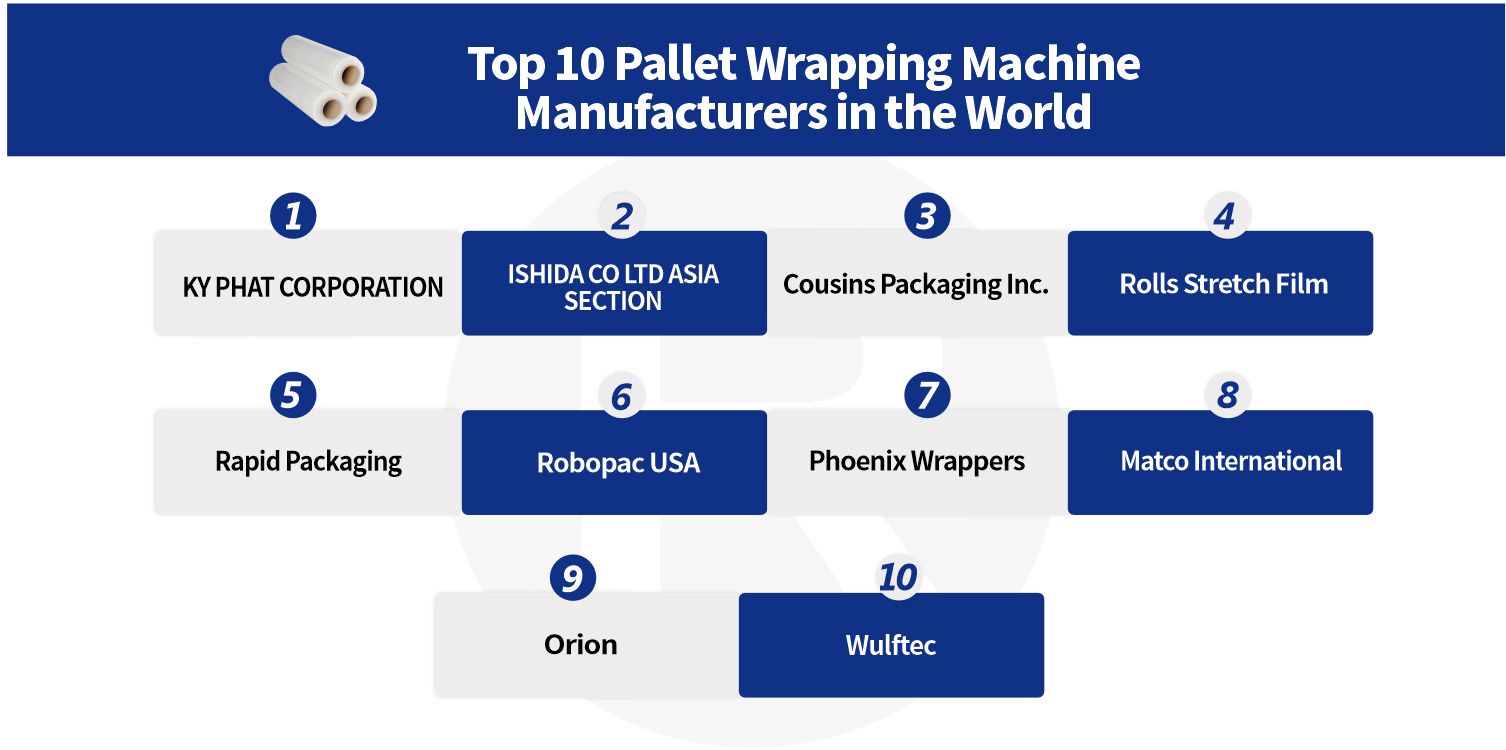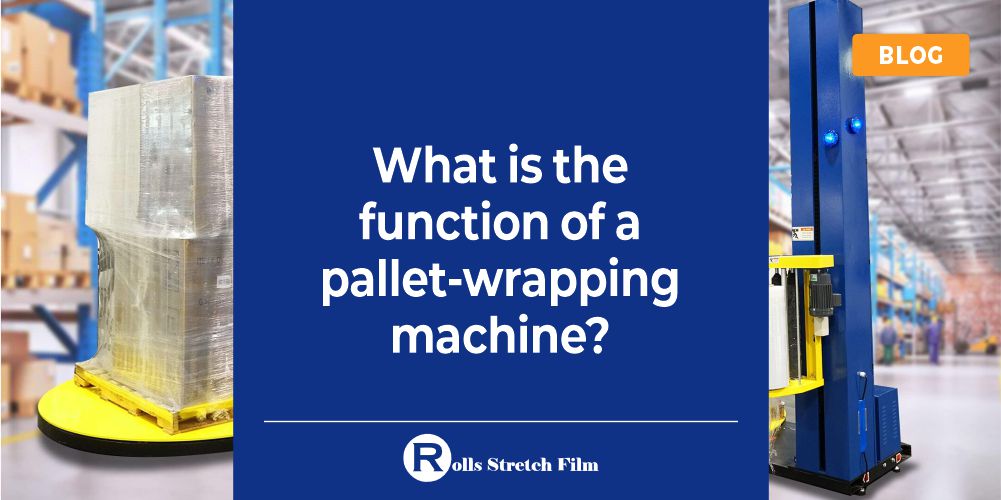Are you curious about the many ways that stretch film is used across industries? You’re in the right place! “A Comprehensive Study of Stretch Film Applications Across Industries”! From securing pallets for shipping to protecting furniture during a move, stretch film has countless applications in today’s world. But what makes this versatile material so popular? And how are different industries putting it to use? We’ll explore the fascinating world of stretch film and its many applications. So, buckle up and get ready to learn all about this essential material!
Here are some stretch film applications:
- Securing pallets for shipping
- Wrapping food items for freshness and preservation
- Protecting furniture and other items during a move or storage
- Binding and bundling items together
- Containing hazardous waste or chemicals
- Covering and protecting surfaces during construction or renovation
- Creating protective barriers around machinery or equipment
- Shielding against moisture, dust, and dirt during transportation or storage
- Providing a tight seal around packages to prevent tampering or damage

In this article, we’ll take a deep dive into the world of stretch film and its many uses. You’ll learn about everything from the basics of how it’s made to the creative ways that companies are putting it to use in their day-to-day operations. So, if you’re ready to expand your, don’t miss out on our comprehensive study of stretch film applications!
Definition of Stretch Film
Stretch film, also known as stretch wrap, is a highly versatile and elastic-plastic film that is used to wrap and secure items for storage or transport. It is commonly made from linear low-density polyethylene (LLDPE) resin, which gives it its stretchable and flexible properties. The film is wrapped around the item, exerting tension to keep it tightly secured and protected. Stretch film is often used in industries such as shipping, warehousing, and manufacturing, but can also be found in everyday applications such as protecting furniture during a move.
- Table 1: Comparison of Stretch Film Application Methods
| Application Method | Description | Benefits | Drawbacks |
|---|---|---|---|
| Hand Wrap | Requires an operator to manually wrap the stretch film around the load [3] | Flexible, no machine investment needed | Labor-intensive, not suitable for large volumes |
| Automatic Machine Wrap | Uses automated machinery to wrap the stretch film around the load [5] | Efficient for large volumes, consistent wrap quality | Requires machine investment, less flexible |
Importance of Stretch Film Market
The stretch film market plays a crucial role in numerous industries, providing a cost-effective and reliable solution for packaging, shipping, and storing goods. The use of stretch film has become increasingly popular due to its ability to securely wrap and protect items of various shapes and sizes. This has led to significant growth in the industry, creating new opportunities for companies to innovate and improve their packaging processes. Additionally, the widespread use of stretch film has helped to reduce shipping costs by minimizing the risk of damage during transit. In turn, this has resulted in lower overall product costs and increased efficiency for businesses.

Global Market Size and Growth Prospects
The global stretch film market has experienced significant growth in recent years and is projected to continue expanding in the coming years. According to industry reports, the market size was valued at approximately USD 8.5 billion in 2020 and is expected to reach USD 12.3 billion by 2027, growing at a compound annual growth rate (CAGR) of around 5.3% from 2021 to 2027.
The increasing demand for stretch film can be attributed to several factors, including the rise of e-commerce and online shopping, as well as the growth of various industries such as food & beverage, pharmaceuticals, and logistics. Additionally, the development of sustainable and eco-friendly stretch films has opened up new opportunities for market players to tap into changing consumer preferences.
Regional Analysis of Market Share and Growth Drivers
The stretch film market is a global industry with strong demand in various regions around the world. The Asia-Pacific region holds the largest share of the market due to the high concentration of manufacturing activities and the growing e-commerce sector in countries such as China, India, and Japan. This region is projected to continue leading the market in the coming years due to the increasing use of stretch film in logistics, food & beverage, and other industries.
North America and Europe are also significant markets for stretch film, driven by the established packaging and shipping industries in these regions. In North America, the United States is the largest consumer of stretch film, while in Europe, countries such as Germany, France, and the UK are major markets.
The growth of the stretch film market can be attributed to several factors, including the rise of e-commerce and online shopping, which have increased the demand for efficient and reliable packaging solutions. Additionally, the growth of various industries such as pharmaceuticals, food & beverage, and automotive has contributed to the expansion of the market.
- Table 2: Overview of Top Stretch Film Brands
| Brand | Notable Products | Strengths |
|---|---|---|
| Alliance | SteelFlex Blown Hand Film, SteelFlex Cast Hand Film | Known for toughness, effective in extreme conditions |
| IPG (Intertape Polymer Group) | Variety of blown and cast stretch films | Versatile product range for different applications |
| Sigma | Performance Blown Hand Film | Puncture and tear resistance, reduces film breaks |
| Berry | Fortitude: Ultra Performance, Hybrid Hand Wrap | Lightweight, reinforced edges, suitable for all applications |
| Malpack | Vmax Wrapplicator | Easy application, reduces likelihood of pallet collapse |
| Amtopp | MegaStar, LoadStar Plus, Apex films | High performance series for demanding applications |
| Paragon | Torque | High quality, crystal clear optics, superior characteristics |
Key Players in the Market
- Berry Global – a global manufacturer of packaging and protection solutions, including stretch film.
- Intertape Polymer Group – a leading manufacturer of packaging products, including stretch film.
- Sigma Plastics Group – a manufacturer of flexible packaging products, including stretch film.
- AEP Industries – a company that specializes in the production of plastic films and bags, including stretch films.
- Coveris – a multinational manufacturer of packaging and engineered coatings solutions, including stretch film.
- Dow Chemical Company – a leading producer of chemicals and plastics, including stretch film.
- Manuli Stretch – a manufacturer of stretch film and other packaging materials.
- Paragon Films – a company that specializes in the production of high-performance stretch films.
- Scientex – a Malaysian company that produces a wide range of packaging products, including stretch film.
- S. Packaging & Wrapping LLC – a supplier of packaging materials, including stretch film.
Types of Stretch Film Products
Hand Stretch Film
As the name suggests, hand stretch film is primarily designed for the manual wrapping of products. It is commonly used in small-to-medium scale operations where the volume of goods to be wrapped is not very high.
Machine Stretch Film
Machine stretch film is designed for use with automated wrapping machines. It is typically thinner and stronger than hand stretch film and requires specialized equipment to apply. Machine stretch film is commonly used in large-scale operations where the volume of goods to be wrapped is high, such as in warehousing and logistics.
Specialty Stretch Film
Specialty stretch film products are designed for specific applications or to meet unique customer requirements. For example, UV-resistant stretch films may be used for outdoor storage or transportation, while anti-static stretch films may be used in the manufacture of electronic components.
Other Stretch Film Products
In addition to the above categories, there are several other types of stretch film products available in the market. For instance, pre-stretched stretch film is a type of machine stretch film that has already been stretched during production.

Applications of Stretch Film
Packaging and Shipping
The stretch film is commonly used for packaging and shipping products as it provides a secure and tamper-evident seal around the goods. It can be easily wrapped around products of different shapes and sizes, protecting them from damage during transit.
Storage and Warehousing
The stretch film is also used extensively in storage and warehousing operations to protect goods from dust, moisture, and other environmental factors. It can be wrapped around pallets or individual items, ensuring that they remain secure and protected until they are ready to be shipped or moved.
Industrial and Manufacturing Processes
The stretch film plays a critical role in many industrial and manufacturing processes, such as wrapping raw materials and finished products. It can help to keep these items clean and free from contamination, while also ensuring that they remain securely wrapped during transportation within the factory or warehouse.
Retail Display and Merchandising
The stretch film is often used in retail settings for display and merchandising purposes. For instance, it may be used to wrap bundles of products together or to secure products to a display stand. This helps to create an attractive and organized retail environment while also protecting the products from damage.
Materials Used in Stretch Film Manufacturing
Linear Low-Density Polyethylene (LLDPE)
LLDPE is the most widely used material in stretch film manufacturing due to its superior strength and flexibility. It is a highly versatile material that can be easily stretched and molded to conform to different shapes and sizes.
Low-Density Polyethylene (LDPE)
LDPE is a softer and more flexible material than LLDPE, making it ideal for wrapping irregularly shaped items. LDPE stretch films have lower tensile strength than LLDPE but are still durable and tear-resistant.
High-Density Polyethylene (HDPE)
HDPE is a stiffer and more rigid material than LLDPE or LDPE, which makes it less suitable for stretch film applications. However, it is often used as an inner layer in co-extruded stretch films to provide additional strength and puncture resistance.
Environmental Impact and Sustainability Issues
Recycling and Waste Reduction Efforts
One way that stretches film manufacturers are addressing sustainability issues is by implementing recycling and waste reduction initiatives. This includes using recycled materials in the production process and reducing the amount of waste generated during manufacturing.
Biodegradable and Compostable Alternatives
Another approach to sustainability is the development of biodegradable and compostable stretch films made from natural materials such as cornstarch or plant-based polymers. These materials break down more easily in the environment, reducing their impact on landfills and other waste streams.
Regulations and Standards
Several regulations and standards have been put in place to encourage sustainable practices in the stretch film industry. For example, the European Union has introduced the Packaging and Packaging Waste Directive, which requires companies to meet specific sustainability targets for their packaging materials
Future Outlook and Opportunities
Emerging Technologies and Innovations
Advances in technology are driving innovation in the stretch film industry, with companies investing heavily in research and development to improve their products and processes. For example, some companies are developing smart stretch films that can monitor the condition of goods during transport, while others are exploring the use of nanotechnology to enhance the strength and durability of stretch films.
New Applications and Markets
As businesses continue to seek more efficient and sustainable packaging solutions, new applications and markets for stretch films are emerging. For instance, there is growing demand for stretch films made from bio-based materials such as cornstarch or sugarcane, which offer a more sustainable alternative to traditional petroleum-based stretch films.
Challenges and Risks
While the stretch film industry presents numerous opportunities for growth and innovation, it also faces several challenges and risks. One of the biggest concerns is the impact of environmental regulations on the production and disposal of stretch films. Companies will need to adapt to evolving regulations and consumer preferences by developing more sustainable products and practices.

In conclusion, the stretch film market plays a vital role in many industries, providing a reliable and cost-effective solution for packaging, shipping, and storing goods. With the increasing demand for efficient and sustainable packaging solutions, stretch films are becoming more versatile, adaptable, and environmentally friendly. By addressing challenges and risks associated with the industry and staying ahead of emerging technologies and market trends, companies can position themselves for success in this dynamic and essential industry.













